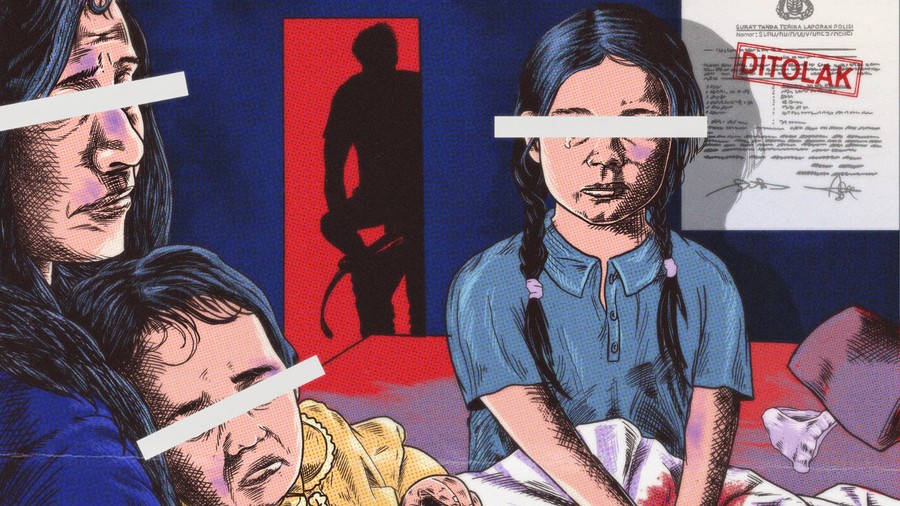An attempt to silence allegations of police inaction has backfired and led to a deafening outcry against authorities’ handling of an incestuous rape case involving small children.
On Indonesian Twitter, the hashtag #PercumaLaporPolisi trended over the past few days, highlighting alleged inaction by law enforcement — and their apparent unwillingness to accept criticism — in Indonesia.
The hashtag, which roughly translates to, “it’s useless to report to the police,” has been used in over 32,000 tweets as of this story’s publication. Indonesians are enraged after a report published on Oct. 6 by public journalism initiative Project Multatuli revealed how police officers in East Luwu, South Sulawesi abruptly stopped an investigation into a rape case involving three children under the age of 10, allegedly at the hands of their own father.
The father is reportedly a high-ranking government official in the region. That may explain why the mother’s search for justice was beset with procedural blunders and skepticism from authorities. Eventually, police stopped their investigation into the case after only two months.
Project Multatuli’s article touched on what seems like an obvious conflict of interest, while also illustrating the larger issue of the ineffectiveness of law enforcement in Indonesia, especially on cases of sexual violence, thus giving way for #PercumaLaporPolisi to flourish online.
To silence and not to serve
Fahri Salam, Chief Editor at Project Multatuli, told Coconuts that his team began receiving complaints from readers about difficulties accessing the article at around 6pm on Wednesday — just hours after the story was published.
“At 7pm, the content was pushed on Project Multatuli’s social media. At 8pm, the police precinct in East Luwu ‘clarified’ the report and stamped our report as a hoax,” Fahri said.
Fahri was referring to the precinct boldly and unilaterally labelling Project Multatuli’s article as misinformation on their Instagram account, @HumasReslutim. The precinct also effectively doxxed the mother as they revealed her identity in a post, even though Project Multatuli safeguarded it out of concern for her privacy and safety.
As the article began circulating even more widely online, it eventually became inaccessible.
“There were a lot of people who read the article. At first, we thought that they were curious about our report. But, then we realized the next morning that it was an organized cyber attack,” Fahri said.
By that point, it appeared that Project Multatuli’s website fell victim to a torrent of DDoS attacks. Fahri said that by around 7am on Oct. 7, over 1.7 million users swamped their page and overloaded the system.
According to Imal, a member of SAFENet, an NGO that works to protect freedom of speech in Southeast Asia, 1.7 million may not be a huge number for other media outlets, but it is enough to cause a temporary collapse for sites like Project Multatuli, which are smaller in comparison.
Project Multatuli also experienced cyber attacks on their social media accounts. On Instagram, a post for the article was removed due to complaints flagging it for violating the platform’s community guidelines.
Imal said the cyber attacks on Project Multatuli constitutes an effort to silence the press as it limited the story from being shared widely. In this particular case, even if authorities can prove that the journalistic product was a hoax, it could have been handled in a more appropriate manner.
“SAFENet believes digital rights are part of human rights, where freedom of speech is also part of human rights. So, to complicate the access of verified public information is also violating [digital and human rights],” he said.
Can truth — and justice — prevail?
Those attacks, however, didn’t stop Indonesians from accessing and sharing the original article, as people started linking the Wayback Machine archive as an alternative.
In an inspiring moment for press freedom and unity in Indonesia, major media outlets across the country — namely Kompas, Tempo, Tirto, Suara, VICE Indonesia, IndoProgress — republished Project Multatuli’s article in full, out of solidarity with the victims and Project Multatuli.

“We are really thankful to media outlets that have stood in solidarity with Project Multatuli. However, this is not only about Project Multatuli,” Fahri said.
“[It’s about] press freedom and siding with the victims.”
One can only hope that the attempt to silence the story, which has so far backfired in the face of the silencers in that the matter has grabbed national attention, would prompt the police to finally launch a proper investigation into the rape case.





Reader Interactions